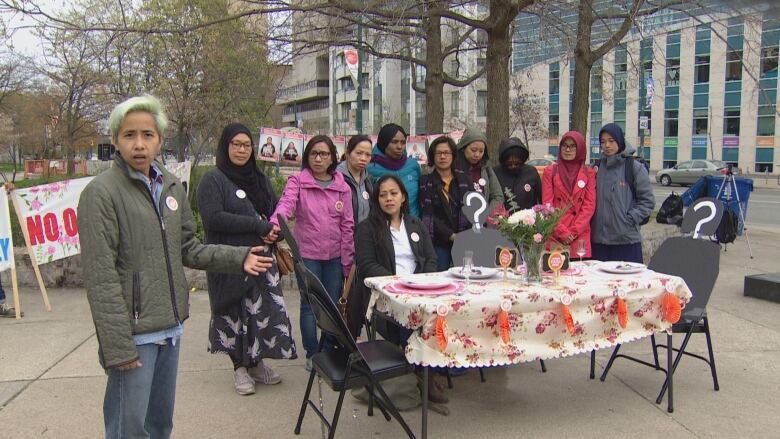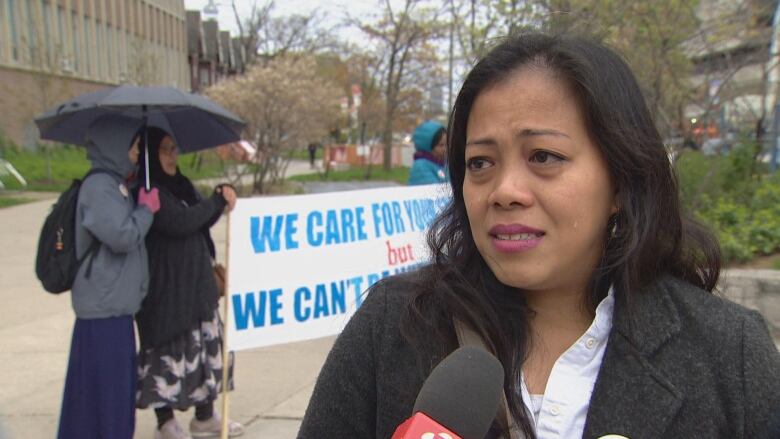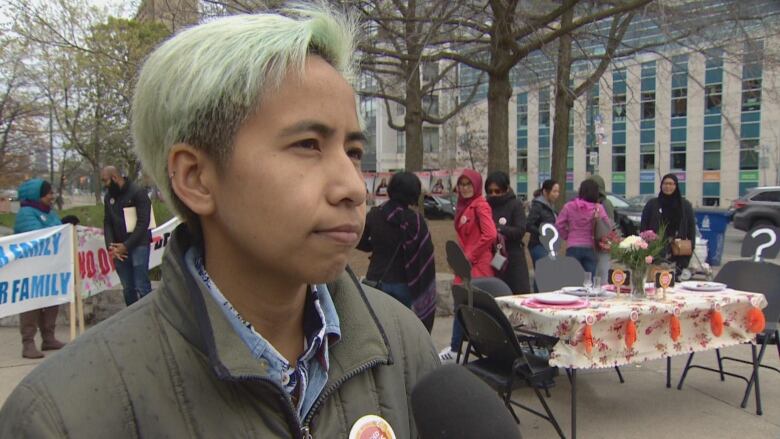Migrant caregivers make fresh call for better immigration program
Immigration struggles are undeserved for a profession that supports families, caregivers say

Migrant caregivers organized a sombre Mother's Day brunch on Sunday calling for the federal government to easebarriers to permanent resident (PR) status.
Care workers set up a display at Bloor Street West and Spadina Avenue to symbolize the family they wish to bring to Canada from their home countries.
Filipino care worker Jhoey Cruz has been separated from her two daughters for 16 years. She moved to Canada two years ago after working in Hong Kong.
Cruz said the prospect of bringing her children here is bleak since Canada's current caregiver immigration program expires in November with no firm replacement program in place.
"It's hard because I wanted to be with them [for Mother's Day] but I can't," Cruz told CBC Toronto with teary eyes. "With all these things that's happening, it's really hard."
New caregiver programs planned
The current program sets a hard cap of 2,750 applications each for childcare and 'high medical needs' caregivers.
Immigration Minister Ahmed Hussan announced plans for two replacement pilot programs in February that will:
- Both have a maximum of 2,750 principal applicants each, for a total of 5,500 principal applicants, per year.
- Pave an easier pathway to permanent residency.
- Grant occupational work permits to caregivers and open permits to their family members.
Mathieu Genest, spokesperson for the Immigration Minister, said the ministry hopes to correct the errors of the previous program.

"We made a commitment to improve pathways to permanent residency for caregivers and our new system delivers on that promise," Genest wrote in an email.
"This means better protection for caregivers in the workplace and no longer having to make the difficult decision to be separated from their families."
In the meantime, Ottawa launched an interim caregiver program in March that allows qualifying caregivers to apply for PR status until June 4.
Caregivers are not optimistic
But Caregivers Action Centre coordinator Kara Manso isn't confident in the government's plans, given no legislation is yet in place to implement the new pilots.

Meanwhile, she said, caregivers are left with a lacklustre immigration program and exclusionary interim plan due to unrealistic educational and language requirements.
"I came here through the caregiver program and I can see that [the issues are] still happening," Manso said.
"There is so much problem with the program."
The ideal program, Manso said, would involve reduced language, education and work requirements.
She would also like to seecaregivers and their families obtain PR status the moment they land in Canada.Manso feels this should have been implemented decades ago.
"The permanent solution is permanent residency, and they're just avoiding that solution."
We're actually helping Canadian families.- Jhoey Cruz, immigrant care worker
For Cruz, she hopes the government can finally implement a program that brings caregivers and their families together.
She believes care workers' immigration struggles are undeserved for a profession that supports families and, by extension, the economy.
"It's not like we're dragging [everyone] down, we're actually helping Canadian families."












_(720p).jpg)


 OFFICIAL HD MUSIC VIDEO.jpg)
.jpg)



























































































